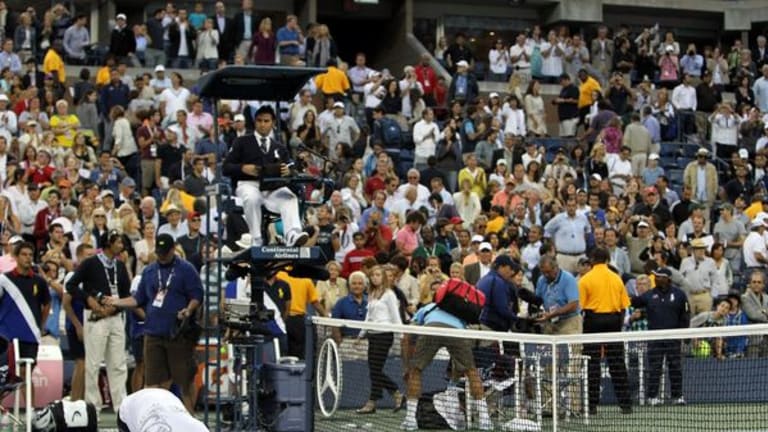by Pete Bodo
NEW YORK—I had intended to parse a Roger Federer or Novak Djokovic presser as a companion piece to my earlier post on Rafael Nadal, but the second men's semifinal here at the U.S. Open demands some commentary. You know, the match that "ruined" the putative dream final, but sent Djokovic's stock higher than it's been since he bagged his first and thus far only major in Australia a few years ago.
The other day I wrote that Rafa and Roger have been advancing through the tournament as if pulled on separate rails by an invisible hand. It began when each of them had one of the year's most dangerous players placed in his path: Rafa had Tomas Berdych (who didn't make it past the first round), Roger had Robin Soderling. Each man had an intense "wind match" and so forth. . .
But the most compelling parallel was hidden from view until Djokovic knocked Federer out of the tournament this evening, in a spectacularly entertaining match featuring the best fifth set we've seen in a long time. But instead of ruining the theme, it only reinforces it: For now, Rafa is in exactly the same position Federer experienced in 2009 at Roland Garros. With his great rival cleared out of his path, Rafa will have to take all the pressure onto his shoulders. I'm not going to underestimate the threat Djokovic represents, but when you go toe-to-toe with the consensus GOAT (an encomium that will hold up for at least 16 more hours) for three hours and 45 minutes, you will pay a price.
In Paris last year, Federer had to navigate by four dangerous opponents after Nadal lost, but everyone suddenly expected Roger to win the whole shooting match. He had some shaky moments against Tommy Haas, Gael Monfils, Juan Martin del Potro and Robin Soderling, but he came through. Rafa's task was made easier today by the fact that Federer survived to the semis; he's got just one man to beat, although he couldn't be any more dangerous—if you discount the 800-pound gorilla in the room, fatigue.
I'll say this for Djokovic, his attitude tonight after he dismissed Federer was strikingly good. He might have come in complaining about the general unfairness of life, or at least the USTA and the CBS network, but he chose to take the high road. At times, he even laughed at the dimensions of his problem. When I asked him to walk us through his next few, critical hours of recovery—if he would be taking an ice-bath, a massage, etc.—he quipped:
"No. Popcorn, watching TV, relaxing."
The cavalier way he said it caused the assembled reporters to collectively guffaw. Djokovic laughed right along with them, then added: "Yeah, I will do anything that comes up to your mind legally, recovery-wise. (More laughter). I will do it. You know, I cannot go into details too much. . . Emotional recovery with my girlfriend, and a couple of things that I cannot talk about. (More laughter). It's not what you think, I know what you're thinking. . . "
I pressed him on that—was he djoking around, or playing his cards close to his vest?
"Well, you know, everyone has his own private things he does off the court. Just not for public, I guess. But definitely I will have to do a lot of recovery."
I don't know how his legs will bounce back, but his spirits and good-natured optimism have already recovered.
All seven of Djokovic's wins over Nadal (the head-to-head is 14-7 in favor of Rafa) have come on a hard court, and Djokovic sees a slight mental advantage in that statistic. But he knows what he's up against and he appears untroubled. Djokovic also fielded a number of questions on the rivalry between Federer and Nadal. Under the circumstances, you couldn't blame him if he had yelled "What am I, chopped liver?" and hurled the mike at his interlocutor.
But of our obsession with the two top players, he said: "Yeah, well it's normal. They are the two most dominant players in the the last five, six years, so it's logical that people talk about them mostly and that they want to see them playing in the finals. Everybody talks about their rivalry, their, you know, match-ups, the greatness of each player.
It's normal. For me, I don't think I've done bad the last three or four years. I don't think I've done bad with my achievements. But I am not, you know, kind of disappointed that people are not talking about me more. It's just waiting for my moment to come.
I'm competing in an era of two, you know, great-greats. Two players winning most of the majors. It's not easy, if you know what I mean."
Spoken like a champ, no matter what tomorrow brings.
